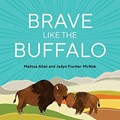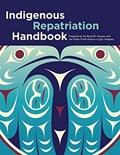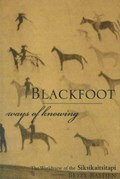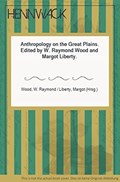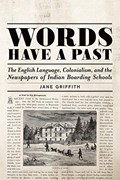Narrow Results By
- Wall Kimmerer, Robin 3
- Webstad, Phyllis 2
- Adese, Jennifer 1
- Allan, Melissa 1
- Auger, Neepin 1
- Barbeau, Marius 1
- Barman, Jean 1
- Bastien, Betty 1
- Black, Liza 1
- Blondin, Walter; Blondin, George; Goose, Leanne; Mountain, Antoine; Stewart, Sarah; Yakeleya, Raymond; and Dene Elders; foreword by Blondin, Walter. 1
- Brown, Chester 1
- Carlson-Manathara, Elizabeth and Rowe, Gladys 1
Remembering our relations : De¨nesu liné oral histories of Wood Buffalo National Park
https://archives.whyte.org/en/permalink/catalogue26250
- Medium
- Library - Book (including soft-cover and pamphlets)
- Published Date
- 2023
- Publisher
- Calgary, Alberta : University of Calgary Press
- Call Number
- 07.2 At3r
- Responsibility
- Athabasca Chipewyan First Nation with Sabina Trimble and Peter Fortna.
- Publisher
- Calgary, Alberta : University of Calgary Press
- Published Date
- 2023
- Physical Description
- xxxiii, 307 pages cm
- Subjects
- Indigenous
- Indigenous Culture
- Indigenous Customs
- Indigenous People
- Indigenous Traditions
- Oral History
- Athabasca Chipewyan First Nations
- Wood Buffalo National Park
- Alberta
- British Columbia
- Abstract
- Elders and leaders remind us that telling and amplifying histories is key for healing. Remembering Our Relations is an ambitious collaborative oral history project that shares the story of Wood Buffalo National Park and the De¨nesu line´ peoples it displaced. Wood Buffalo National Park is located in the heart of De¨nesu line´ homelands, where Dené people have lived from time immemorial. Central to the creation, expansion, and management of this park, Canada’s largest at nearly 45, 000 square kilometers, was the eviction of De¨nesu line´ people from their home, the forced separation of Dene families, and restriction of their Treaty rights. Remembering Our Relations tells the history of Wood Buffalo National Park from a Dene perspective and within the context of Treaty 8. Oral history and testimony from Dene Elders, knowledge-holders, leaders, and community members place De¨nesu line´ voices first. With supporting archival research, this book demonstrates how the founding, expansion, and management of Wood Buffalo National Park fits into a wider pattern of promises broken by settler colonial governments managing land use throughout the twentieth and twenty-first centuries. By prioritizing De¨nesu line´ histories Remembering Our Relations deliberately challenges how Dene experiences have been erased, and how this erasure has been used to justify violence against De¨nesu line´ homelands and people. Amplifying the voices and lives of the past, present, and future, Remembering Our Relations is a crucial step in the journey for healing and justice De¨nesu line´ peoples have been pursuing for over a century. -- Provided by publisher.
- ISBN
- 9781773854113
- Accession Number
- P2024.02
- Call Number
- 07.2 At3r
- Collection
- Archives Library
This material is presented as originally created; it may contain outdated cultural descriptions and
potentially offensive content.
Read more.
Transformative politics of nature : overcoming barriers to conservation in Canada
https://archives.whyte.org/en/permalink/catalogue26252
- Medium
- Library - Book (including soft-cover and pamphlets)
- Published Date
- 2023
- Publisher
- Toronto ; Buffalo ; London : University of Toronto Press
- Call Number
- 04 Ol4t
- Responsibility
- Edited by Andrea Olive, Chance Finegan, and Karen F. Beazley
- Publisher
- Toronto ; Buffalo ; London : University of Toronto Press
- Published Date
- 2023
- Physical Description
- x, 310 pages : illustrations (black and white), map ; 23 cm
- Subjects
- Environment
- Environmentalism
- Conservation
- Politics
- Indigenous
- Indigenous Peoples
- Law
- Canada
- Abstract
- Transformative Politics of Nature highlights the most significant barriers to conservation in Canada and discusses strategies to confront and overcome them. Featuring contributions from academics as well as practitioners, the volume brings together the perspectives of both Indigenous and non-Indigenous experts on land and wildlife conservation, in a way that honours and respects all peoples and nature. Contributors provide insights that enhance understanding of key barriers, important actors, and strategies for shaping policy at multiple levels of government across Canada. The chapters engage academics, environmental conservation organizations, and Indigenous communities in dialogues and explorations of the politics of wildlife conservation. They address broad and interrelated themes, organized into three parts: barriers to conservation, transformation through reconciliation, and transformation through policy and governance. Together, they demonstrate and highlight the need for increased social-political awareness of biodiversity and conservation in Canada, enhanced wildlife conservation collaborative networks, and increased scholarly attention to the principle, policies, and practices of maintaining and restoring nature for the benefit of all peoples, other species, and ecologies. Transformative Politics of Nature presents a vision of profound change in the way humans relate to each other and with the natural world. -- Provided by publisher.
- Contents
- OPENING CEREMONY -- Beginning / Shalan Joudry -- PART A: INTRODUCTION -- 1. From politics to transformative politics in Canada / Karen F. Beazley, Andrea Olive, and Chance Finegan -- INTRODUCING DISRUPTIONS / Chance Finegan -- PART B: BARRIERS TO CONSERVATION IN CANADA -- 2. A pathological examination of conservation failure in Canada / Christopher J. Lemieux, Mark W. Groulx, Trevor Swerdfager, and Shannon Hagerman -- 3. Who should govern wildlife? Examining attitudes across the country / Matthew A. Williamson, Stacy Lischka, Andrea Olive, Jeremy Pitman, and Adam T. Ford -- 4. In a rut: barriers to caribou recovery / Julee Boan and Rachel Plotkin -- 5. Enacting a reciprocal ethic of care: (finally) fulfilling treaty obligations / Larry McDermott and Robin Roth -- DISRUPTIONS, PART B -- Disrupting dominant narratives for a mainstream conservation issue: a case study on "saving the bees" / Sheila R. Colla -- The national parks in disrupting heritage interpretation on Turtle Island / Chance Finegan -- PART C: TRANSFORMATION THROUGH VALUES -- 6. Reconciliation or Apiksitaultimik? indigenous relationality for conservation / Sherry Pictou -- 7. "etuaptmumk / two-eyed seeing and reconciliation with Earth" / Deborah McGregor, Jesse Popp, Andrea Reid, Elder Albert Marshall, Jacquelyn Miller, and Mahisha Sritharan -- 8. Beacons of teachings / Lisa Young -- DISRUPTIONS, PART C -- Indigenous knowledge as a disruption to state-led conservation / Natasha Myhal -- The Misipawistik Cree Nation kanawenihcikew guardians program / Heidi Cook -- PART D: TRANSFORMATION THROUGH ACTION -- 9. Transforming university cirriculum and student experiences through collaboration and land-based learning / Melanie Zurba, James Doucette, and Bridget Graham -- 10. Ecological networks and corridors in the context of global initiatives / Jodi A. Hilty and Stephen Woodley -- 11. The imperative for transformative change to address biodiversity loss in Canada / Justina C. Ray -- DISRUPTIONS, PART D. -- Conservation bright spots: focusing on solutions instead reacting to problems / Barbara Frei -- Disrupting current approaches to biodiversity conservation through innovative knowledge mobilization / Vivian Nguyen -- PART E: CONCLUSION -- 12. Achieving transformative change: conservation in Canada, 2023 and beyond / Andrea Olive and Karen F. Beazley -- CLOSING CEREMONY -- Onward / Shalan Joudry
- ISBN
- 9781487550516
- Accession Number
- P2024.02
- Call Number
- 04 Ol4t
- Collection
- Archives Library
This material is presented as originally created; it may contain outdated cultural descriptions and
potentially offensive content.
Read more.
Decolonizing sport
https://archives.whyte.org/en/permalink/catalogue26241
- Medium
- Library - Book (including soft-cover and pamphlets)
- Published Date
- 2023
- Publisher
- Halifax ; Winnipeg : Fernwood Publishing
- Call Number
- 07.2 F77d
- Responsibility
- Edited by Janice Forsyth, Christine O'Bonsawin, Russell Field, and Murray G. Phillips
- Publisher
- Halifax ; Winnipeg : Fernwood Publishing
- Published Date
- 2023
- Physical Description
- xi, 276 pages : illustrations ; 23 cm
- Subjects
- Canada
- History-Canada
- Education
- Sport
- Indigenous
- Indigenous Culture
- Indigenous People
- Indigenous Traditions
- Indigenous Customs
- Abstract
- The path to decolonization is difficult and complex, and can even be contradictory at times, as when an Indigenous community enlists the same corporate sponsor that will destroy its natural environment to provide sport programming for its youth. There is no easy way forward. The Black Lives Matter movement, and their massive followers on social media, propelled forward discussions about the inequities that Covid-19 highlighted with unprecedented momentum. Indigenous people in Canada voiced their concerns in solidarity, calling attention to disparities they faced in everything from impoverished Indigenous health care initiatives to the overrepresentation of Indigenous people in the Canadian justice system, demanding to be heard alongside systemic change. Structural adjustments were afoot, including changes in the professional sport leagues. In both the United States and Canada, people witnessed the toppling of racist sports team names and logos in the spring and summer, not the least of which included the American Washington NFL team (Redskins) and the Canadian Edmonton CFL team (Eskimos). Clearly Indigenous people and their allies saw sport as a part of this desire for social change. This multi-authored collection contributes to that desire by bringing the work of Indigenous and non-Indigenous allied scholars together to explore the history of sport, physical activity, and embodied physical culture in the Indigenous context. Including chapters that address Indigenous topics beyond the political boundaries of Canada, including the US, Australia, New Zealand/Aotearoa, and Kenya, this collection considers questions such as: How can the history of sport (a colonizing practice with European origins) exist in dialogue with Indigenous voices to open up possibilities for reconsidering the history of modern sport? How can Indigenous and anti-oppressive research methodologies/methods inform the study of sport history? What are the ethics and responsibilities associated with conducting an Indigenous sport or recreation history? How can sport history as a discipline be open to the study of traditional land-based recreation? How can the meanings of "sport" be made more inclusive to include a variety of recreational practices? How can sport historians learn from histories of colonization and how can they contribute to a more reciprocal approach to knowledge formation through Indigenous community engagement? How can the discipline of sport history meaningfully support movements of Indigenous resurgence, regeneration, and decolonization? -- Provided by publisher.
- Contents
- Ways of knowing: sport, colonialism, and decolonization / Janice Forsyth, Christine O'Bonsawin, Russell Field -- Beyond competition: an Indigenous perspective on organized sport / Brian Rice -- More than a mascot: how the mascot debate erases Indigenous people in sport / Natalie Welch -- Witnessing painful pasts: understanding images of sports at Canadian Indian residential schools / Taylor McKee and Janice Forsyth -- The absence of Indigenous moving bodies: whiteness and decolonizing sport history / Malcolm MacLean -- # 87: using Wikipedia for sport reconciliation / Victoria Paraschak -- Olympism at face value: the legal feasibility of Indigenous-led Olympic Games / Christine O'Bonsawin -- Canoe racing to fishing guides: sport and settler colonialism in Mi'kma'ki / John Reid -- Transcending colonialism?: rodeos and racing in Lethbridge / Robert Kossuth -- "Men pride themselves on feats of endurance": masculinities and movement cultures in Kenyan running history / Michelle M. Sikes -- Stealing, drinking, and not cooperating: sport and everyday resistance in Aboriginal settlements in Australia / Gary Osmond -- Let's make baseball!: practices of unsettling on the recreational ball diamonds of Tkaronto/Toronto / Craig Fortier and Colin Hastings -- Subjugating and liberating at once: Indigenous sport history as a double-edge sword / Brendan Hokowhitu.
- ISBN
- 9781773636344
- Accession Number
- P2024.02
- Call Number
- 07.2 F77d
- Collection
- Archives Library
This material is presented as originally created; it may contain outdated cultural descriptions and
potentially offensive content.
Read more.
School of racism : a Canadian history, 1830-1915
https://archives.whyte.org/en/permalink/catalogue26242
- Medium
- Library - Book (including soft-cover and pamphlets)
- Published Date
- 2023
- Author
- Larochelle, Catherine
- Publisher
- Winnipeg, Manitoba, Canada : University of Manitoba Press
- Edition
- First English-language edition
- Call Number
- 08.1 L32s
- Author
- Larochelle, Catherine
- Responsibility
- Translated by S.E. Stewart
- Edition
- First English-language edition
- Publisher
- Winnipeg, Manitoba, Canada : University of Manitoba Press
- Published Date
- 2023
- Physical Description
- viii, 464 pages : illustrations ; 24 cm
- Abstract
- Exposing the history of racism in Canada's classrooms Winner of the prestigious Clio-Quebec, Lionel-Groulx, and Canadian History of Education Association awards In School of Racism, Catherine Larochelle demonstrates how Quebec's school system has, from its inception and for decades, taught and endorsed colonial domination and racism. This English translation of the award-winning book extends its crucial lesson to readers across the country, bridging English- and French-Canadian histories to deliver a better understanding of Canada's past and present identity. Using postcolonial, antiracist, and feminist theories and methodologies, Larochelle examines late-nineteenth and early-twentieth-century classroom materials used in Quebec's public and private schools. Many of these textbooks, and others like them, made their way into curricula across Canada. Larochelle's innovative analysis illuminates how textual and visual representations found in these archives constructed Indigenous, Black, Arab, and Asian peoples as "the Other" while reinforcing the collective identity of Quebec, and Canada more broadly, as white. Uncovering the origins and persistence of individual and systemic racism against people of colour, Larochelle shows how Otherness was presented to--and utilized by--young Canadians for almost a century. School of Racism names the ways in which Canada's education system has supported and sustained ideologies of white supremacy--ideologies so deeply embedded that they still linger in school texts and programming today. The book offers new insight into how Canadian and Quebecois concepts of nationalism and racism overlap, helps educators confront racism in their classrooms, and deepens urgent discussions about race and colonialism throughout Canada. -- Provided by publisher.
- Contents
- Cover -- Contents -- Author's Note -- Introduction -- Chapter 1. The Theories of Otherness -- Chapter 2. Other Societies: Imperialist Knowledge and Orientalist Representations -- Chapter 3. The Other-Body, or Alterity Inscribed in the Flesh -- Chapter 4. The Indian: Domination, Erasure, and Appropriation -- Chapter 5. The Other Observed or "Teaching through the Eyes" -- Chapter 6. Of Missions and Emotions: Children and the Missionary Mobilization -- Conclusion -- Acknowledgements -- Appendix -- List of Abbreviations -- Notes -- Bibliography -- Index.
- ISBN
- 9781772840537
- Accession Number
- P2024.02
- Call Number
- 08.1 L32s
- Collection
- Archives Library
This material is presented as originally created; it may contain outdated cultural descriptions and
potentially offensive content.
Read more.
Brave like the buffalo
https://archives.whyte.org/en/permalink/catalogue26206
- Medium
- Library - Book (including soft-cover and pamphlets)
- Published Date
- 2023
- Author
- Allan, Melissa
- Publisher
- Victoria, BC : Rocky Mountain Books
- Call Number
- 07.2 Al5b
- 07.2 Al5b reference copy
- Author
- Allan, Melissa
- Responsibility
- Illustrated by Jadyn Fischer-McNab
- Publisher
- Victoria, BC : Rocky Mountain Books
- Published Date
- 2023
- Subjects
- Children
- Buffalo
- Wildlife
- Indigenous
- Indigenous People
- Cree
- Abstract
- Brave Like the Buffalo is a children’s book with a message that will inspire all readers to face the storms in their life with the help of their support systems and with a brave mindset. Baby buffalo is surprised and scared when a storm on the prairies passes through. Mama buffalo puts on a brave face and demonstrates how to use courage and bravery to get through the literal and metaphorical storms we may face in life. Written by Melissa Allan and illustrated by Cree illustrator Jadyn Fischer-McNab, this story uses a powerful animal, the buffalo, as a symbolic message and connection to Indigenous ways of knowing and being that helps to create a wonderful narrative rich with Indigenous ties and a heartwarming message around facing adversity. Brave Like the Buffalo is intended for audiences aged 4-8, to be used educationally as a way to intertwine Indigenous ways of knowing and being through story. -- From publisher
- ISBN
- 9781771606448
- Accession Number
- P2023.25
- Call Number
- 07.2 Al5b
- 07.2 Al5b reference copy
- Location
- Reference copy located in Reading Room
- Collection
- Archives Library
This material is presented as originally created; it may contain outdated cultural descriptions and
potentially offensive content.
Read more.
Indigenous repatriation handbook
https://archives.whyte.org/en/permalink/catalogue26210
- Medium
- Library - Book (including soft-cover and pamphlets)
- Published Date
- 2019
- Publisher
- Victoria, BC : Royal British Columbia Museum
- Call Number
- 07.2 C69i
- Responsibility
- Prepared by Jisang Nika Collison, Sdaahl K'awaas Lucy Bell, and Lou-ann Neal
- Publisher
- Victoria, BC : Royal British Columbia Museum
- Published Date
- 2019
- Physical Description
- 162 pages ; 6 cm
- Abstract
- A reference for BC Indigenous communities and museums, created by and for Indigenous people working in repatriation. -- From back cover
- Contents
- 1. Introduction -- 2. Organizing a successful repatriation -- 3. Conducting research -- 4. Repatriation from the royal BC museum -- 5. Repatriation for other institutions -- 6. For institutions wishing to repatriate to Indigenous Peoples in BC -- 7. Case study: repatriation journey of the Haida Nation -- APPENDIX -- A. Glossary of terms -- B. Indigenous museums and cultural centres in Canada -- C. Organizational templates, procedures and examples -- D. Fundraising resouces -- E. Sample letters to museums -- F. Tips for planning for travel and transport -- G. Global museums with major indigenous collections from BC -- H. Resources on education in indigenous museology -- I. Frequently asked questions about repatriation -- J. Repatriation stories.
- ISBN
- 9780772673176
- Accession Number
- P2023.25
- Call Number
- 07.2 C69i
- Collection
- Archives Library
This material is presented as originally created; it may contain outdated cultural descriptions and
potentially offensive content.
Read more.
Blackfoot ways of knowing : the worldview of the Siksikaitsitapi
https://archives.whyte.org/en/permalink/catalogue26211
- Medium
- Library - Book (including soft-cover and pamphlets)
- Published Date
- 2023
- Author
- Bastien, Betty
- Publisher
- Calgary : University of Calgary Press
- Edition
- 9th printing
- Call Number
- 07.2 B29b
- Author
- Bastien, Betty
- Responsibility
- Ju¨rgen W. Kremer, editor ; Duane Mistaken Chief, language consultant.
- Edition
- 9th printing
- Publisher
- Calgary : University of Calgary Press
- Published Date
- 2023
- Physical Description
- xx, 235 pages : illustrations, portraits ; 23 cm
- Subjects
- Blackfoot
- Siksikaitsitapi
- Indigenous
- Indigenous Culture
- Indigenous Customs
- Indigenous People
- Indigenous Traditions
- Indigenous Language
- Abstract
- The worldview of the Siksikaitsitapi is a journey into the heart and soul of Blackfoot culture. In sharing her personal story of coming home to reclaim her identity within that culture, Betty Bastien offers us a gateway into traditional Blackfoot ways of understanding and experiencing the world. As a scholar and researcher, Bastien is also able to place Blackfoot tradition within the context of knowledge building among indigenous peoples generally, and within an historical context of precarious survival amid colonial displacement and cultural genocide. -- From back cover
- Contents
- Context -- Introduction -- Innahkootaitsinnika'topi -- History of the Blackfoot-speaking tribes -- Introductory remarks -- Iitotasimahpi Iimitaiks -- The era of the dog or the time of the ancestors (Pre-eighteenth century) -- Ao'ta'sao'si Ponokaomita -- the era of the horse (eighteeneth century to 1880) -- Ao'maopao'si -- from when we settled in one place (1880) to today -- Cultural destruction -- policies of ordinary genocide -- Tribal protocol and affirmative inquiry -- Niinohkanistssksinipi -- Speaking personally -- Traditional knowledge in academe -- Cultural affirmation -- Protocol of affirmative inquiry -- Affirmation of indigenous knowledge -- Kakyosin -- traditional knowledge -- Kiitomohpiipotoko -- ontological responsibilities -- Siksikaitsitapi ways of knowing -- epistemology -- Knowledge is coming to know Ihtsipaitapiiyo'pa -- Kakyosin/Mokaksin -- Indigenous learning -- Niisi'powahsinni-language -- Aipommotsspistsi -- transfers -- Kaaahsinnooniksi -- grandparents -- Conclusion: renewal of ancestral responsibilities as antidote to genocide -- Deconstructing the colonized mind -- Eurocentred and Niitsitapi identity -- Reflections and implications.
- ISBN
- 9781552381090
- Accession Number
- P2023.25
- Call Number
- 07.2 B29b
- Collection
- Archives Library
This material is presented as originally created; it may contain outdated cultural descriptions and
potentially offensive content.
Read more.
Me´tis rising : living our present through the power of our past
https://archives.whyte.org/en/permalink/catalogue26200
- Medium
- Library - Book (including soft-cover and pamphlets)
- Published Date
- 2022
- Publisher
- Vancouver, British Columbia : Purich Books
- Call Number
- 07.2 B71m
- Responsibility
- Edited by Yvonne Boyer and Larry Chartrand
- Publisher
- Vancouver, British Columbia : Purich Books
- Published Date
- 2022
- Physical Description
- viii, 275 pages : illustrations, maps ; 23 cm
- Abstract
- Me´tis Rising draws on a remarkable cross-section of perspectives to tell the histories, stories, and dreams of people from varied backgrounds, demonstrating that there is no single Me´tis experience - only a common sense of belonging and a commitment to justice. The contributors to this unique collection, most of whom are Me´tis themselves, examine often-neglected aspects of Me´tis existence in Canada. They trace a turbulent course, illustrating how Me´tis leaders were born out of the need to address abhorrent social and economic disparities following the Me´tis-Canadian war of 1885. They talk about the long and arduous journey to rebuild the Me´tis nation from a once marginalized and defeated people; their accounts ranging from personal reflections on identity to tales of advocacy against poverty and poor housing. And they address the indictment of the jurisdictional gap whereby neither federal nor provincial governments would accept governance responsibility towards Me´tis people. Me´tis Rising is an extraordinary work that exemplifies how contemporary Me´tis identity has been forged by social, economic, and political concerns into a force to be reckoned with."-- Provided by publisher.
- Contents
- Part 1: History, Identity, and Belonging -- River Water Flows through Our Veins / Leah Dorion and Curtis Breaton -- What's a Me´tis, Anyway? / Catherine Littlejohn -- The Right to Self-Identify as Me´tis at School / Jonathan Anuik -- Ancestral Knowledge in a Contemporary World / Yvonne Vizina -- Part 2: Leadership and Relationship Building -- Fire Starters and Keepers / Laura-Lee Bellehumeur-Kearns -- Finding a Way around the Jurisdictional Gaps / Tricia Logan -- Navigating Troubled Political Waters for Better Housing / Nathalie Kermoal -- Demanding the Right to Care for Their Own Children / Allyson Stevenson -- Part 3: Exercising Our Rights and Self-Determination -- Who Will Come to Bury You? / Paul Chartrand -- Wiichihiwayshinawn / Margaret Kress -- Stoking the Embers: A Story of Realizing Decolonizing Aims with the Me´tis through Media Agancy / Yvonne Poitras Pratt -- A Me´tis Woman's Journey of Discovery / Judith G. Bartlett
- ISBN
- 9780774880756
- Accession Number
- P2023.23
- Call Number
- 07.2 B71m
- Collection
- Archives Library
This material is presented as originally created; it may contain outdated cultural descriptions and
potentially offensive content.
Read more.
Blood memory : the tragic decline and improbable resurrection of the American Buffalo
https://archives.whyte.org/en/permalink/catalogue26204
- Medium
- Library - Book (including soft-cover and pamphlets)
- Published Date
- 2023
- Author
- Duncan, Dayton and Burns, Ken
- Publisher
- New York : Alfred A. Knopf
- Call Number
- 08 D91b
- Publisher
- New York : Alfred A. Knopf
- Published Date
- 2023
- Physical Description
- xvi, 329 pages : illustrations (chiefly color) ; 24 cm
- Subjects
- Buffalo
- Pablo-Allard buffalo round-up
- Conservation
- Indigenous
- Colonialism
- Environment
- Ecology
- Abstract
- The epic story of the buffalo in America, from prehistoric times to today--a moving and beautifully illustrated work of natural history. The American buffalo--our nation's official mammal-is an improbable, shaggy beast that has found itself at the center of many of our most mythic and sometimes heartbreaking tales. The largest land animals in the Western Hemisphere, they are survivors of a mass extinction that erased ancient species that were even larger. For nearly 10,000 years, they evolved alongside Native people who weaved them into every aspect of daily life; relied on them for food, clothing, and shelter; and revered them as equals. Newcomers to the continent found the buffalo fascinating at first, but in time they came to consider them a hindrance to a young nation's expansion. And in the space of only a decade they were slaughtered by the millions for their hides, with their carcasses left to rot on the prairies. Then, teetering on the brink of disappearing from the face of the earth, they would be rescued by a motley collection of Americans, each of them driven by different--and sometimes competing--impulses. This is the rich and complicated story of a young republic's heedless rush to conquer a continent, but also of the dawn of the conservation era--a story of America at its very best and worst -- Provided by publisher.
- Contents
- Part 1: The Trail to Extinction -- The Buffalo and the People -- Strangers -- Omen in the Skies -- The Iron Horse -- Kills Tomorrow -- Part 2: Back From the Brink -- A Death Wind for My People -- Just in the Nick of Time -- Changes of Heart -- Ghosts -- The Last Refuge -- Blood Memory -- Big Medicine.
- Notes
- Dayton Duncan ; based on a documentary film by Ken Burns ; written by Dayton Duncan ; with an introduction by Ken Burns ; picture research by Emily Mosher and Susan Shumaker ; design by Maggie Hinders.
- Whyte Museum archival collections utilized.
- ISBN
- 9780593537343
- Accession Number
- P2023.25
- Call Number
- 08 D91b
- Collection
- Archives Library
This material is presented as originally created; it may contain outdated cultural descriptions and
potentially offensive content.
Read more.
We remember the coming of the white man
https://archives.whyte.org/en/permalink/catalogue26188
- Medium
- Library - Book (including soft-cover and pamphlets)
- Published Date
- 2021
- Author
- Blondin, Walter; Blondin, George; Goose, Leanne; Mountain, Antoine; Stewart, Sarah; Yakeleya, Raymond; and Dene Elders; foreword by Blondin, Walter.
- Publisher
- Calgary, Alberta, Canada : Durvile & UpRoute Books
- Call Number
- 07.2 St4w
- Responsibility
- Edited by Sarah Stewart and Raymond Yakeleya
- Publisher
- Calgary, Alberta, Canada : Durvile & UpRoute Books
- Published Date
- 2021
- Physical Description
- xiii, 273 pages : illustrations ; 23 cm + 1 videodisc (4 3/4 in.)
- Subjects
- Dene
- Indigenous
- Indigenous Culture
- Indigenous People
- Indigenous Customs
- Language
- Non-fiction
- Oral History
- Abstract
- Chapters are transcripts of oral histories from the early twentieth century, by ten elders of the Dene people, about the early days of fur trading, guns, and missionaries; their dismay about the way oil and uranium discoveries and pipelines were handled on their land; and the emotional fallout of the signing of Treaty 11.
- Contents
- Preface / Raymond Yakeleya -- Part I, Reflections. Foreward, Walter Blondin -- Treaty 11, Sarah Stewart -- We remember, Raymond Yakeleya -- The Dene nation / Sarah Stewart -- The Métis experience / Colette Poitras -- Part II, The elders remember. The elders / Elizabeth Yakeleya, Sarah Simon, Mary Wilson, Joe Blondin, John Blondin, Isadore Yukon, Johnny Kaye, Jim Edwards Sittichinli, Peter Thompson, Andrew Kunnizzi -- Early days -- Fur, guns, contact -- Family life -- Boat time -- Missionaries -- Oil discovery -- Treaty 11 -- The sickness -- Uranium -- First machines -- The mad trapper -- Canol road -- Mackenzie Valley pipeline -- Time of change -- Part III Stories from the people. Tutichak, Leanne Goose -- How the muskrat created the world / Antoine Mountain, Maurice Mendo -- The slingshot and the songbird / Raymond Yakeleya -- In the land of the Na?àcho / George Blondin -- The drums / George Blondin -- When the white people came / George Blondin -- Acknowledgments -- Authors -- The spirit of nature series.
- Notes
- Companion DVD includes "We remember the coming of the white man" directed by Raymond Yakeleya, 1978, 55 min. Remastered and produced in 2020. Includes director's commentary.
- ISBN
- 9781988824635
- Accession Number
- P2022.14
- Call Number
- 07.2 St4w
- Collection
- Archives Library
This material is presented as originally created; it may contain outdated cultural descriptions and
potentially offensive content.
Read more.
Anthropology on the Great Plains
https://archives.whyte.org/en/permalink/catalogue26190
- Medium
- Library - Book (including soft-cover and pamphlets)
- Published Date
- 1980
- Publisher
- Lincoln : University of Nebraska Press
- Call Number
- 07.2 W86a
- Responsibility
- Edited by W. Raymond Wood and Margot Liberty
- Publisher
- Lincoln : University of Nebraska Press
- Published Date
- 1980
- Physical Description
- vii, 306 pages : illustrations ; 27 cm
- Subjects
- Indigenous
- Indigenous Culture
- Indigenous Customs
- Indigenous People
- Indigenous Traditions
- Turtle Island
- History
- Abstract
- Native American tribes living on the Great Plains have long attracted the attention of Euro-American scholars, inspiring over the years a vast quantity of research. The contributors to this volume discuss and evaluate all the major works of scholarship devoted to the culture of Plains Indians, from the arrival of these peoples on the North American grasslands thousands of years ago, through their subsequent Village and High Plains lifeways, to their present-day adaption to reservation and urban life. Toghether, the twenty-two authors undertake a comprehensive survey of the state of anthropology on the Plains: what it has been, what it is now, and what it may offer theory and method in the future. -- From interior dustjacket
- Contents
- The Plains setting / B. Miles Gilbert -- The influence of Plains ethnography on the development of anthropological theory / E. Adamson Hoebel -- The Plains culture area concept / Richard Scaglion -- Prehistoric studies on the Plains / Alfred E. Johnson and W. Raymond Wood -- An overview of Great Plains physical anthropology / David V. Hughey -- Studies in Plains linguistics : a review / Robert C. Hollow and Douglas R. Parks -- Plains trade in prehistoric and protohistoric intertribal relations / W. Raymond Wood -- The ethnohistorical approach in Plains area studies / Mildred Mott Wedel and Raymond J. DeMallie -- Plains economic analysis : the Marxist complement / Alan M. Klein -- Morgan's problem : the influence of Plains ethnography on the ethnology of kinship / John H. Moore -- Social control on the Plains / Garrick Bailey -- The Sun Dance / Margot Liberty -- The Ghost Dance / Omer C. Stewart -- The Native American church / Omer C. Stewart -- Plains Indian art / Mary Jane Schneider -- Plains Indian music and dance / William K. Powers -- Psychological anthropology / Margot Liberty and Robert Morais --The formal education of Plains Indians / Janet Goldenstein Ahler -- Plains Indian women : an assessment / Katherine M. Weist -- Research in health and healing in the Plains / Luis S. Kemnitzer -- Peoples of the Plains / compiled by Douglas R. Parks, Margot Liberty, and Andrea Ferenci.
- ISBN
- 9780803247086
- Accession Number
- 2022.17
- Call Number
- 07.2 W86a
- Collection
- Archives Library
This material is presented as originally created; it may contain outdated cultural descriptions and
potentially offensive content.
Read more.
With our orange hearts
https://archives.whyte.org/en/permalink/catalogue26183
- Medium
- Library - Book (including soft-cover and pamphlets)
- Published Date
- 2022
- Author
- Webstad, Phyllis
- Publisher
- Medicine Wheel Publishing
- Call Number
- 05 W39w
- 05 W39w Reference copy
- Author
- Webstad, Phyllis
- Responsibility
- Illustrated by Emily Kewageshig
- Publisher
- Medicine Wheel Publishing
- Published Date
- 2022
- Physical Description
- 24 pages ; ill.
- Subjects
- Literature
- Children
- Indigenous
- Reconciliation
- Abstract
- As a young child, your little world can be full of big feelings. In this book, I, Phyllis Webstad, founder of Orange Shirt Day, show how sharing my story with the world helped me process my feelings. My true story encourages young children to open their hearts when others share their feelings, and be more comfortable sharing their own feelings, too. Listening is a first step towards reconciliation. It's never too early to start. -- From back cover.
- ISBN
- 978198122976
- Accession Number
- P2023.17 (2)
- Call Number
- 05 W39w
- 05 W39w Reference copy
- Collection
- Archives Library
This material is presented as originally created; it may contain outdated cultural descriptions and
potentially offensive content.
Read more.
The golden grindstone : the adventures of George M. Mitchell
https://archives.whyte.org/en/permalink/catalogue26172
- Medium
- Library - Book (including soft-cover and pamphlets)
- Published Date
- 1935
- Publisher
- Toronto : Oxford University Press, Canadian Branch
- Call Number
- 08.2 G76g
- Responsibility
- Recorded by Angus Graham
- Publisher
- Toronto : Oxford University Press, Canadian Branch
- Published Date
- 1935
- Contents
- I. The general idea -- II. The geographical problem -- III. The immigrant train -- IV. Edmonton -- V. Athbasca landing -- VI. The Athabasca River -- VII. Grand rapids -- VIII. The Slave River -- IX. Great Slave Lake -- X. Fort Simpson -- XI. The Mackenzie River -- XII. Fort McPherson --XIII. The Eskimo -- XIV. The first traffic with the Indians -- XV. The Peel River -- The upper Peel River and the valley of noises -- XVII. Gold -- XVIII. The winter camp -- XIX. Prospecting and exploration -- XX. Bears and wolves -- XXI. The winter night -- XXII. The Indians' visit -- XXIII. Dogs -- XXIV. The broken knee -- XXV. The last of the white men -- XXVI. The Indian Camp -- XXVI. The Indian Camp -- XXVII. Caribou -- XXVIII. The old lady -- XXIX. Famine and riot -- XXX. Mitchell becomes an Indian -- XXXI. An Indian "Veillee" -- XXXII. Women -- XXXIII. The closest shave of all -- XXXIV. The skin boats -- XXXV. Summer hunting -- XXXVI. Mitchell remains an Indian -- XXXVII. The last of the Indians.
- Accession Number
- 2023.47
- Call Number
- 08.2 G76g
- Collection
- Archives Library
This material is presented as originally created; it may contain outdated cultural descriptions and
potentially offensive content.
Read more.
A stunning backdrop : Alberta in the movies, 1917-1960
https://archives.whyte.org/en/permalink/catalogue25734
- Medium
- Library - Book (including soft-cover and pamphlets)
- Published Date
- 2022
- Author
- Graham, Mary
- Publisher
- Calgary, AB : Bighorn Books, an imprint of University of Calgary Press
- Call Number
- 06.3 G76a
2 websites
- Author
- Graham, Mary
- Publisher
- Calgary, AB : Bighorn Books, an imprint of University of Calgary Press
- Published Date
- 2022
- Physical Description
- xi, 401 pages : illustrations (some color) ; 22 x 28 cm
- Abstract
- The unconventional, untold story of Alberta's film history, defined by the terrible beautify of its pristine landscape, surprisingly important to Hollywood, and recaptured in lost or ignored Indigenous perspectives and stories. Alberta's magnificent landscape has served as a popular location for filmmakers since the dawn of the movie industry. For film pioneers, Alberta embodied the myth of the Great Northwest, a primeval mountain wilderness and the last western frontier. In turn, Canadian entrepreneurs were eager for American studios to drape Alberta landscape across the backdrop of their movies, an advertisement without equal. A Stunning Backdrop is the untold story of six rollicking decades of filmmaking in Alberta. Mary Graham draws on twelve years of exhaustive research to reveal a film history like no other, illuminating the deep importance of the province to Hollywood. She explores the often friendly partnerships between American filmmakers and Indigenous communities, particularly the Stoney Nakoda, that provided economic opportunities and, in many cases, allowed them to retain religious and cultural practices banned by the Canadian government. Beautifully illustrated with archival photography and featuring century-old set stills alongside photographs of the locations as they appear today, by Jean Becq, Solomon Chiniquay, Jeff Wallace, George Webber, and Paul Zizka, A Stunning Backdrop is the fascinating, often surprising, always unconventional story of film in a province whose rugged, compelling, multifarious, terribly beautiful landscape continues to inspire filmmakers and audiences around the world.-- Provided by publisher.
- Contents
- Early Alberta movie landscapes today -- Into the (civilized) wilds -- Snow! snow! snow! -- A rabble rouser and a dreamer -- Father of the western -- In the shadow of Castle Mountain -- Royalty, great chiefs, ranches, and rodeos -- The joy girl and others of a gregarious nature -- Mountain men -- Building the railway, movie style -- War and propaganda -- Out of the coma -- Rodeo westerns of the atomic age -- Selling sex and nostalgia -- Making Rocky Mountain movie magic -- The power of revision -- List of movies made in Alberta, 1917-1960
- Notes
- Mary Graham received the Whyte Museum's Lillian Agnes Jones Fellowship, 2021-2022.
- ISBN
- 9781773853932
- Accession Number
- P2023.20
- Call Number
- 06.3 G76a
- Collection
- Archives Library
Websites
This material is presented as originally created; it may contain outdated cultural descriptions and
potentially offensive content.
Read more.
Words have a past : the English language, colonialism, and the newspapers of Indian boarding schools
https://archives.whyte.org/en/permalink/catalogue25726
- Medium
- Library - Book (including soft-cover and pamphlets)
- Published Date
- 2019
- Author
- Griffith, Jane
- Publisher
- Toronto ; Buffalo ; London : University of Toronto Press
- Call Number
- 07.2 G87w
- Author
- Griffith, Jane
- Publisher
- Toronto ; Buffalo ; London : University of Toronto Press
- Published Date
- 2019
- Physical Description
- xi, 314 pages : illustrations ; 23 cm
- Abstract
- For nearly 100 years, Indian boarding schools in Canada and the US produced newspapers read by white settlers, government officials, and Indigenous parents. These newspapers were used as a settler colonial tool, yet within these tightly controlled narratives there also existed sites of resistance. This book traces colonial narratives of language, time, and place from the nineteenth-century to the present day, post-Truth and Reconciliation Commission. -- Provided by publisher.
- Contents
- Bury the lede: introduction -- Printer's devil: the trade of newspapers -- Indigenous languages did not disappear: English language instruction -- "Getting Indian words": representations of indigenous languages -- Ahead by a century: time on paper -- Anachronishm: reading the nineteenth century today -- Layout: space, place, and land -- Concluding thoughts.
- ISBN
- 9781487521554
- Accession Number
- P2023.12
- Call Number
- 07.2 G87w
- Collection
- Archives Library
This material is presented as originally created; it may contain outdated cultural descriptions and
potentially offensive content.
Read more.
Carrying the burden of peace : reimagining Indigenous masculinities through story
https://archives.whyte.org/en/permalink/catalogue25728
- Medium
- Library - Book (including soft-cover and pamphlets)
- Published Date
- 2021
- Author
- McKegney, Sam
- Publisher
- Regina, Saskatchewan, Canada : University of Regina Press
- Call Number
- 07.2 M19c
- Author
- McKegney, Sam
- Publisher
- Regina, Saskatchewan, Canada : University of Regina Press
- Published Date
- 2021
- Physical Description
- xxxiii, 263 pages : illustrations ; 24 cm
- Subjects
- Indigenous
- Indigenous Culture
- Indigenous Customs
- Indigenous Peoples
- Indigenous Traditions
- Masculinity
- Canada
- History
- Abstract
- Through rigorous engagement with Indigenous literary art, Carrying the Burden of Peace highlights the decolonial potential of Indigenous masculinities. Can a critical examination of Indigenous masculinities be an honour song--one that celebrates rather than pathologizes; one that seeks diversity and strength; one that overturns heteropatriarchy without centering settler colonialism? Can a critical examination of Indigenous masculinities even be creative, inclusive, erotic? Carrying the Burden of Peace answers affirmatively. Countering the perception that masculinity has been so contaminated as to be irredeemable, the book explores Indigenous literary art for understandings of masculinity that exceed the impoverished inheritance of colonialism. Carrying the Burden of Peace weaves together stories of Indigenous life, love, eroticism, pain, and joy to map the contours of diverse, empowered, and non-dominant Indigenous masculinities. It is from here that a more balanced world may be pursued. -- Provided by publisher.
- Contents
- Indigenous masculinities and story -- Shame and deterritorialization -- Journeying back to the body -- De(f/v)iant generosity: gender and the gift -- Masculinity and kinship -- Naked and dreaming forward: a conclusion.
- ISBN
- 9780889777934
- Accession Number
- P2023.15
- Call Number
- 07.2 M19c
- Collection
- Archives Library
This material is presented as originally created; it may contain outdated cultural descriptions and
potentially offensive content.
Read more.
Indigenous media arts in Canada : making, caring, sharing
https://archives.whyte.org/en/permalink/catalogue25729
- Medium
- Library - Book (including soft-cover and pamphlets)
- Published Date
- 2023
- Publisher
- Waterloo, Ontario : Wilfrid Laurier University Press
- Call Number
- 07.2 C54m
- Responsibility
- Edited by Dana Claxton and Ezra Winton
- Publisher
- Waterloo, Ontario : Wilfrid Laurier University Press
- Published Date
- 2023
- Physical Description
- 437 pages
- Abstract
- A timely and crucial collection of essays and conversations focused on Indigenous-settler cultural politics and the ethics of Indigenous representation in Canada’s media arts that explores issues of narrative sovereignty, cultural identity, cultural resistance and decolonizing creative practices. -- Provided by publisher.
- ISBN
- 9781771125413
- Accession Number
- P2023.15
- Call Number
- 07.2 C54m
- Collection
- Archives Library
This material is presented as originally created; it may contain outdated cultural descriptions and
potentially offensive content.
Read more.
Indigenous methodologies : characteristics, conversations, and contexts
https://archives.whyte.org/en/permalink/catalogue25730
- Medium
- Library - Book (including soft-cover and pamphlets)
- Published Date
- 2021
- Author
- Kovach, Margaret
- Publisher
- Toronto ; Buffalo ; London : University of Toronto Press
- Call Number
- 07.2 K84i
- Author
- Kovach, Margaret
- Publisher
- Toronto ; Buffalo ; London : University of Toronto Press
- Published Date
- 2021
- Physical Description
- xii, 313 pages : illustrations ; 23 cm
- Abstract
- An innovative and important contribution to Indigenous research approaches, this revised second edition provides a framework for conducting Indigenous methodologies, serving as an entry point to learn more broadly about Indigenous research. -- Provided by publisher.
- Contents
- Prologue: opening the circle -- Introduction -- Part One: Starting Indigenous methodologies -- Indigenous methodologies and qualitative inquiry -- Indigenous conceptual framing in Indigenous methodologies -- Part Two: Four foundations: Indigenous conceptual framing in Indigenous methodologies -- Epistemology and research: centring Indigenous knowledges -- Indigenous ethics and axiology: miny´o (A Good Way) -- Engaging with the Indigenous community in research -- Preparations: situating self, culture, and purpose in Indigenous methodologies -- Part Three: Applying Indigenous methodologies -- Story and method in Indigenous methodologies -- Indigenous theorizing -- Analysing, interpreting, and meaning making -- Presenting findings, metamorphic framing, and representation -- Oral dissemination and capacity building in Indigenous methodologies -- Part Four: Indigenous methodologies strong -- Conclusion: decolonizing the academy through asserting Indigenous methodologies -- Closing circle words and an epilogue.
- ISBN
- 9781487525644
- Accession Number
- P2023.15
- Call Number
- 07.2 K84i
- Collection
- Archives Library
This material is presented as originally created; it may contain outdated cultural descriptions and
potentially offensive content.
Read more.
Walking together, working together : engaging wisdom for indigenous well-being
https://archives.whyte.org/en/permalink/catalogue25722
- Medium
- Library - Book (including soft-cover and pamphlets)
- Published Date
- 2022
- Publisher
- Edmonton, Alberta : Polynya Press, an imprint of University of Alberta Press
- Call Number
- 07.2 J62w
- Responsibility
- Edited by Leslie Main Johnson and Janelle Marie Baker
- Publisher
- Edmonton, Alberta : Polynya Press, an imprint of University of Alberta Press
- Published Date
- 2022
- Physical Description
- xii, 304 pages : illustrations ; 23 cm.
- Abstract
- This collection takes a holistic view of well-being, seeking complementarities between Indigenous approaches to healing and Western biomedicine. Topics include traditional healers and approaches to treatment of disease and illness; traditional knowledge and intellectual property around medicinal plant knowledge; the role of diet and traditional foods in health promotion; culturally sensitive approaches to healing work with urban Indigenous populations; and integrating biomedicine, alternative therapies, and Indigenous healing in clinical practice. Throughout, the voices of Elders, healers, physicians, and scholars are in dialogue to promote Indigenous community well-being through collaboration. This book will be of interest to scholars in Indigenous Studies, medicine and public health, medical anthropology, and anyone involved with care delivery and public health in Indigenous communities. Contributors: Darlene Auger, Dorothy Badry, Margaret David, Meda DeWitt, Hal Eagletail, Gary L. Ferguson III, Marc Fonda, Annie Goose, Angela Grier (Pioohksoopanskii), Leslie Main Johnson, Allison Kelliher, Patrick Lightning, Mary Maje, Maria Mayan, Ruby E. Morgan, Richard T. Oster, Ann Maje Raider, Camille (Pablo) Russell, Ginetta Salvalaggio, Ellen L. Toth, Harry Watchmaker. -- Provided by publisher.
- Contents
- Building pathways to well-being and healing : an introduction: Working Together looking for pathways to well-being and healing / Leslie Main Johnson -- Spiritual pathway to health and balance / Harry Watchmaker -- Bringing traditional medicine into the medical system / Camille (Pablo) Russell and Hal Eagletail -- Traditional Indigenous model of health and well-being : how does the Western Physician Work Within this Paradigm? / Darlene Auger -- Healing journey, working for Kaska wellness / Mary Maje and Ann Maje Raider -- Dim Wila Dil dils'm, (the way we live :Gitxsan approaches to a comprehensive health plan, the Gitxsan Traditional Health Plan / Ruby E. Morgan, Luu Giss Yee -- Holistic and culturally based approaches to health promotion in Alaska native communities / Gary Ferguson, Meda DeWitt and Margaret David -- Southeast Tlingit rites of passage for women's puberty: a participatory action Approach / Meda DeWitt, Ts´a Tse´e Na´akw/Khaat Klla.at -- zHealth and healing on the edges of Canada : a photovoice project in Ulukhhaktok, N.T. / Dorothy Badry and Annie I. Goose -- Traditional knowledge: science, and protection / Marc Fonda -- Diabetes and culture : time to truly and sincerely listen to indigenous peoples / Richard T. Oster, Angela Grier, Rick Lightning, Maria J. Mayan, and Ellen L. Toth -- 'Here', 'Now,' and health research : developing shared priorities within scholarship / Ginetta Salvalaggio -- Nature is Medicine / Allison Kelliher -- Paths forward : Concluding Words / Leslie Main Johnson
- Notes
- Some chapters previously presented at conference Wisdom Engaged: Traditional Knowledge for Northern Community Well-Being (University of Alberta, Edmonton, 2015).
- ISBN
- 9781772125375
- Accession Number
- P2023.14
- Call Number
- 07.2 J62w
- Collection
- Archives Library
This material is presented as originally created; it may contain outdated cultural descriptions and
potentially offensive content.
Read more.
Plants, people, and places : the roles of ethnobotany and ethnoecology in Indigenous peoples' land rights in Canada and beyond
https://archives.whyte.org/en/permalink/catalogue25723
- Medium
- Library - Book (including soft-cover and pamphlets)
- Published Date
- 2020
- Publisher
- Montreal ; Kingston ; London ; Chicago : McGill-Queen's University Press
- Call Number
- 07.2 T85p
- Responsibility
- Edited by Nancy J. Turner
- Publisher
- Montreal ; Kingston ; London ; Chicago : McGill-Queen's University Press
- Published Date
- 2020
- Physical Description
- xxxii, 480 pages : illustrations, maps ; 25 cm.
- Subjects
- Indigenous
- Indigenous Culture
- Indigenous Traditions
- Indigenous Peoples
- Indigenous Customs
- Plants, Edible
- Plants, Medicinal
- Abstract
- For millennia, plants and their habitats have been fundamental to the lives of Indigenous Peoples--as sources of food and nutrition, medicines, and technological materials--and central to ceremonial traditions, spiritual beliefs, narratives, and language. While the First Peoples of Canada and other parts of the world have developed deep cultural understandings of plants and their environments, this knowledge is often underrecognized in debates about land rights and title, reconciliation, treaty negotiations, and traditional territories. Plants, People, and Places argues that the time is long past due to recognize and accommodate Indigenous Peoples' relationships with plants and their ecosystems. Essays in this volume, by leading voices in philosophy, Indigenous law, and environmental sustainability, consider the critical importance of botanical and ecological knowledge to land rights and related legal and government policy, planning, and decision making in Canada, the United States, Sweden, and New Zealand. Analyzing specific cases in which Indigenous Peoples' inherent rights to the environment have been denied or restricted, this collection promotes future prosperity through more effective and just recognition of the historical use of and care for plants in Indigenous cultures. A timely book featuring Indigenous perspectives on reconciliation, environmental sustainability, and pathways toward ethnoecological restoration, Plants, People, and Places reveals how much there is to learn from the history of human relationships with nature"-- Provided by publisher.
- Contents
- Introduction: Making a Place for Indigenous Botanical Knowledge and Environmental Values in Land-Use Planning and Decision Making / Nancy J. Turner, Pamela Spalding, and Douglas Deur (Moxmowisa) -- Living from the Land: Food Security and Food Sovereignty Today and into the Future / Jeannette Armstrong -- Nuuc aan ul Plants and Habitats as Reflected in Oral Traditions: Since Raven and Thunderbird Roamed / Marlene Atleo ( eh eh nah tuu kwiss) -- Tamarack and Tobacco / Aaron Mills -- Xa´xli'p Survival Territory: Colonialism, Industrial Land Use, and the Biocultural Sustainability of the Xa´xli'p within the Southern Interior of British Columbia / Arthur Adolph -- Understanding the Past for the Future: Archaeology, Plants, and First Nations' Land Use and Rights / Dana Lepofsky, Chelsey Geralda Armstrong, Darcy Mathews, and Spencer Greening -- Preparing Eden: Indigenous Land Use and European Settlement on Southern Vancouver Island / John Sutton Lutz -- A Place Called Pi´psell: An Indigenous Cultural Keystone Place, Mining, and Secwe´pemc Law / Marianne Ignace and Chief Ronald E. Ignace -- Traditional Plant Medicines and the Protection of Traditional Harvesting Sites / Letitia M. McCune and Alain Cuerrier -- From Traplines to Pipelines: Oil Sands and the Pollution of Berries and Sacred Lands from Northern Alberta to North Dakota / Linda Black Elk and Janelle Marie Baker -- The Legal Application of Ethnoecology: The Girjas Sami Village versus the Swedish State / Lars O¨stlund, Ingela Bergman, Camilla Sandstro¨m, and Malin Bra¨nnstro¨m -- Ta¯ne Mahuta: The Lord of the Forest in Aotearoa New Zealand, His Children, and the Law / Jacinta Ruru -- Cultivating the Imagined Wilderness: Contested Native American Plant Gathering Traditions in America's National Parks / Douglas Deur (Moxmowisa) and Justine E. James Jr -- Ki¯puka Kuleana: Restoring Reciprocity to Coastal Land Tenure and Resource Use in Hawai i / Monica Montgomery and Mehana Blaich Vaughan -- Right Relationships: Legal and Ethical Context for Indigenous Peoples' Land Rights and Responsibilities / Kelly Bannister -- Ethnoecology and Indigenous Legal Traditions in Environmental Governance / Deborah Curran and Val Napoleon -- Indigenous Environmental Stewardship: Do Mechanisms of Biodiversity Conservation Align with or Undermine It? / Monica E. Mulrennan and Ve´ronique Bussie`res -- Tsilhqot'in Nation Aboriginal Title: Ethnoecological and Ethnobotanical Evidence and the Roles and Obligations of the Expert Witness / David M. Robbins and Michael Bendle -- Plants, Habitats, and Litigation for Indigenous Peoples in Canada / Stuart Rush, QC -- Restorying Indigenous Landscapes: Community Restoration and Resurgence / Jeff Corntassel -- Partnerships of Hope: How Ethnoecology Can Support Robust Co-Management Agreements between Public Governments and Indigenous Peoples / Pamela Spalding -- "Passing It On": Renewal of Indigenous Plant Knowledge Systems and Indigenous Approaches to Education / Leigh Joseph (Styawat) -- On Resurgence and Transformative Reconciliation / James Tully -- Retrospective and Concluding Thoughts / Nancy J. Turner with E. Richard Atleo (Umeek) and John Ralston Saul -- Epilogue: Native Plants, Indigenous Societies, and the Land in Canada's Future / Douglas Deur (Moxmowisa), Nancy J. Turner (Galitsimg a), and Kim Recalma-Clutesi (Oqwilowgwa).
- ISBN
- 9780228001836
- Accession Number
- P2023.13
- Call Number
- 07.2 T85p
- Collection
- Archives Library
This material is presented as originally created; it may contain outdated cultural descriptions and
potentially offensive content.
Read more.





